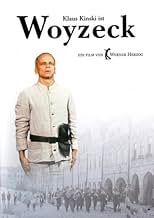Woyzeck
- 1979
- Tous publics
- 1h 20min
NOTE IMDb
7,0/10
11 k
MA NOTE
Franz Woyzeck est un soldat malheureux et sans espoir, seul et impuissant dans la société, assailli de toutes parts par des forces qu'il ne peut contrôler.Franz Woyzeck est un soldat malheureux et sans espoir, seul et impuissant dans la société, assailli de toutes parts par des forces qu'il ne peut contrôler.Franz Woyzeck est un soldat malheureux et sans espoir, seul et impuissant dans la société, assailli de toutes parts par des forces qu'il ne peut contrôler.
- Récompenses
- 3 victoires et 3 nominations au total
Volker Prechtel
- Handwerksbursche
- (as Volker Prechtl)
Rosemarie Heinikel
- Käthe
- (as Rosy-Rosy Heinikel)
Histoire
Le saviez-vous
- AnecdotesThe 80-minute film is mostly shot in long takes and has only 27 edits.
- GaffesAs a barber, Woyzeck smears some foam on the Captain's forehead, but when the camera changes, the foam's gone.
Commentaire à la une
I will put the bottom line at the top so you can decide whether to bother reading on (and seeing this film).
This is certainly not a film for everybody. If you find the following review annoying, and you feel as if you wasted time reading it - BY ALL MEANS - avoid seeing this film, you simply won't enjoy it.
Another Herzog-Kinski masterwork, Woyzeck is one of the weirdest films of the 1970s. I do not use the word "weird" very often, but it is so appropriate for this film that an endless string of adjectives, adverbs and modifiers I would need to replace it seem thoroughly inadequate. Despite the vast and deep power and beauty of this film, I don't want to label it "good". Unlike some of the less surreal Herzog-Kinski collaborations, the amount of attention you pay to this film does not necessarily correspond to the amount of sense you will be able to make of it. Mostly, I think it's a film about psychosis - both personal psychosis (Woyzeck himself) and social psychosis (Woyzeck's miserable treatment at the hands of virtually everybody around him in his back-water town in Nazi occupied Poland).
For the first half of the film you will feel as if you are playing a VERY serious version of Monty Python's "Spot the Loonie." But, in this case, you are looking for the HEAD LOONIE in a whole melange of maniacs. The string of soliloquies which eventually leads to the climactic ending, hearkens back to Shakespearean tragedies, but until the very end, you don't necessarily know whether to think of this film as a comedy or the very dark and sinister tragedy that it seems to be. Even after the film exposes itself so dramatically in the end, I am still inclined to see it as a very deranged bit of comedy as much as anything else. Such is the beauty of Herzog's artistic method - nothing is straightforward, much is hideous and beautiful, and in a peculiar metaphysical and aesthetic sense, it all makes perfect sense.
Klaus Kinski gives a signature performance and the rest of the cast, though excellent, is barely noticeable with Kinski's intensity in the foreground. Though less accessible than many of Kinski's more popular works (Aguirre, Fitzcarraldo, Nosferatu), this is nevertheless a unique and brilliant blend of one of the greatest actor-director teams of all time.
This is certainly not a film for everybody. If you find the following review annoying, and you feel as if you wasted time reading it - BY ALL MEANS - avoid seeing this film, you simply won't enjoy it.
Another Herzog-Kinski masterwork, Woyzeck is one of the weirdest films of the 1970s. I do not use the word "weird" very often, but it is so appropriate for this film that an endless string of adjectives, adverbs and modifiers I would need to replace it seem thoroughly inadequate. Despite the vast and deep power and beauty of this film, I don't want to label it "good". Unlike some of the less surreal Herzog-Kinski collaborations, the amount of attention you pay to this film does not necessarily correspond to the amount of sense you will be able to make of it. Mostly, I think it's a film about psychosis - both personal psychosis (Woyzeck himself) and social psychosis (Woyzeck's miserable treatment at the hands of virtually everybody around him in his back-water town in Nazi occupied Poland).
For the first half of the film you will feel as if you are playing a VERY serious version of Monty Python's "Spot the Loonie." But, in this case, you are looking for the HEAD LOONIE in a whole melange of maniacs. The string of soliloquies which eventually leads to the climactic ending, hearkens back to Shakespearean tragedies, but until the very end, you don't necessarily know whether to think of this film as a comedy or the very dark and sinister tragedy that it seems to be. Even after the film exposes itself so dramatically in the end, I am still inclined to see it as a very deranged bit of comedy as much as anything else. Such is the beauty of Herzog's artistic method - nothing is straightforward, much is hideous and beautiful, and in a peculiar metaphysical and aesthetic sense, it all makes perfect sense.
Klaus Kinski gives a signature performance and the rest of the cast, though excellent, is barely noticeable with Kinski's intensity in the foreground. Though less accessible than many of Kinski's more popular works (Aguirre, Fitzcarraldo, Nosferatu), this is nevertheless a unique and brilliant blend of one of the greatest actor-director teams of all time.
Meilleurs choix
Connectez-vous pour évaluer et suivre la liste de favoris afin de recevoir des recommandations personnalisées
- How long is Woyzeck?Alimenté par Alexa
Détails
Box-office
- Budget
- 900 000 DEM (estimé)
- Durée1 heure 20 minutes
- Mixage
- Rapport de forme
- 1.66 : 1
Contribuer à cette page
Suggérer une modification ou ajouter du contenu manquant



























